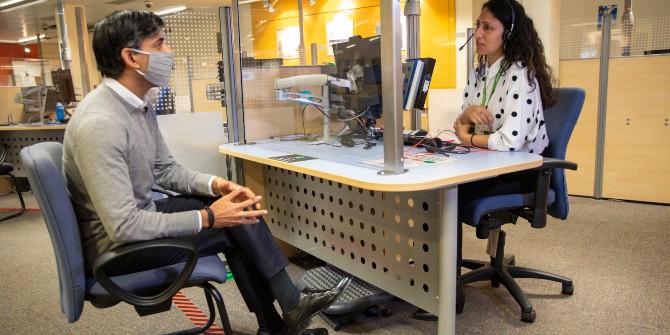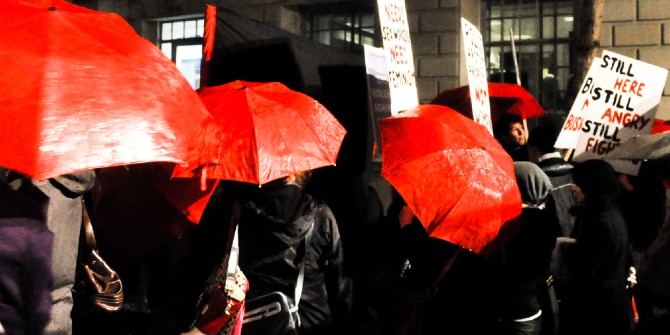Rishi Sunak’s job support schemes were ambitious – at least initially. But did they work? In fact, argue the LSE COVID and Care Research Group, they were conceived with a particular kind of worker in mind: an able-bodied white British national who could easily work from home. Future support schemes need to reflect the large numbers of people in precarious, informal work.
When the chancellor Rishi Sunak announced the Treasury’s Plan for Jobs and Incomes as the UK entered lockdown, many of us were surprised by the breadth of the intervention. The Coronavirus Job Retention Scheme, commonly called furlough, was accompanied by an increase in the Universal Credit Allowance, the Self-Employed Income Support Scheme, and a host of other business support structures including tax payment deferrals, grants and loans. The reach of the Treasury Plan was such that some described the moment as “the end of austerity”, wondering if this marked a fundamental turning point in the Conservative government’s approach to economic policy.
Indeed, the schemes in place through the spring and summer of 2020 have proved helpful to many people in these tumultuous times. The extension of this scheme into the winter is very welcome. Our survey data from June 2020 shows that those benefiting from the furlough scheme welcomed the stability it offered them; those still receiving full pay as their employer topped up their payments valued being able to maintain their standard of living during lockdown; several appreciated continuing to receive income whilst having more time to spend at home with family. Small business owners also identified the financial help and grants made available as important sources of support during lockdown.
Importantly, however, these same survey respondents acknowledged the ‘privilege’ they had in accessing these schemes that others were not enjoying: while the government intervention supported many people, many more were left to struggle without aid. Our research has highlighted the ways in which the government response was shaped by an outdated and reductive model of the UK economy – one which idealises a certain type of worker and a certain type of employer, all the while obscuring and even exacerbating the UK’s historic levels of economic inequality.

The ideal worker in the Treasury model is one who already enjoys secure full-time work. An older bifurcation in the labour force between white-collar and blue-collar workers (the latter have already lost work to automation) was largely reproduced in a split between those who were able to work from home during lockdown (on full income) and those who had to be furloughed (often on reduced income). Still, both these groups enjoyed a comparative advantage to the million people in insecure or gig-based work (ONS 2020), or who were already unemployed, whose only option was Universal Credit.
We don’t have to dig too deep to discover that inequalities of class, gender, race, and citizenship status are all salient in these dynamics. In short, the perfect candidate for the Treasury’s intervention was an able-bodied white British national with a full-time permanent contract, with negligible caring responsibilities, who could easily work either from home or in the office as the government saw fit. Such an imaginary does not reflect large portions of the UK public.
The Work Rights Centre (WoRC) in London and Manchester is an employment justice charity supporting UK and EU nationals facing employment breaches or joblessness. Advisers most commonly find themselves supporting Eastern European migrants and BAME British people. In the months after lockdown, demand for the charity’s services nearly doubled. Many clients were ineligible for furlough and let go from insecure employment. Given the relentless stigmatisation of reliance on welfare, WoRC’s clients were highly resistant to applying for Universal Credit, but the collapse of entire sectors (cleaning, hospitality, construction) made looking for lower skilled employment (such as supermarket roles) or accepting welfare the only options. Further disadvantage arose from insecure housing, which often accompanies insecure employment: not being able to evidence their accommodation costs meant some clients received lower UC payments than they would otherwise have been entitled to, leaving them even more financially and emotionally stretched.
Smaller employers have similarly felt that their needs were not addressed as attentively as the interests of large corporate employers, with informants describing “incredibly chaotic” government messaging that left them to “guess what to do”. In seeking business support, SMEs falling just above the threshold for rateable value were left entirely without help, whereas larger enterprises were able to ‘bundle’ assets into smaller sizes to benefit from the new schemes. Tax relief and ‘Eat Out to Help Out’ disproportionately benefited corporate entities, whereas a refusal to suspend rents pushed many smaller businesses under, since rent was their greatest pressure. The huge differences between small family-owned businesses and private equity firms were ignored – not only differences in assets, but the nature of these ownership models, with the former paying tax and guarding against risk to protect an often vital part of family and/or community life, and the latter actively producing risk through leveraging and doing so in order to avoid paying tax. All the while, desperately needed local authority funds are diminishing through business rates relief and increased local expenditure on pandemic support, leaving public services in a worrying position.
One might argue that a centralised policy response could never maximise benefits for everyone, no matter how nuanced the approach. But this is too facile a response when our data-gathering capacity is stronger than ever, and it obfuscates the ways in which austerity, technological developments, and lack of regulation have fuelled precarious working arrangements, only to ignore these in a time of crisis.
In the immediate context of lockdown, economic support could be made more equitable by designing support packages that acknowledge the diversity of working arrangements in the contemporary UK economy, avoiding further disadvantage to those in informal or precarious work.
- Employers should be held accountable, and employees should be empowered to know what they’re entitled to, and how to access that support.
- Smaller businesses could be helped by making schemes available to those more recently self-employed, and by graduating the support available around the rateable value threshold rather than fixing a hard cut-off line.
- Rent holidays, such as those the National Time Out campaign is calling for, would support many SMEs.
- Government subsidies for business should come with conditions, namely that firms using tax havens should not benefit from taxpayer subsidies, and that private equity firms should not receive the same support as small businesses.
- New community recovery centres could house debt and employment advice services, which should be awarded additional funding to help people through the present circumstances.
- Legal protections for workers need to catch up with the changing economy, strengthening the rights of those in the gig economy and informal sector.
- Quantitative easing should be directed towards forgiving consumer debt.
Furthermore, the analytic work being done should lead us towards an economic policy that supports livelihoods in all their diversity. The government should commission interdisciplinary research into the impact of the pandemic and related policies on various dimensions of inequality along the lines of region, class, gender and so on, working with Local Authorities. It should also evaluate how far extreme economic inequality is worsening as asset accumulation goes unabated at the top end through rentier and financial economies, while many people face the struggles of poverty and precarity, exacerbated by the pandemic.
This could lead to targeted, thoughtful regional regeneration, for example through government investment in family business and SMEs, tying economic prosperity into stability and equity – rather than growth of any kind, at all costs. Ultimately, a social calculus should be applied to economic health, focusing less on productivity and growth and more on redistribution and mitigating deprivation.
The COVID and Care Research Group is composed of anthropologists from the London School of Economics, and associates. Between March and August 2020, the group carried out interviews and surveys across the UK, in order to gather data on the UK public’s response to the pandemic and government policy. This is the second of six posts on LSE COVID-19 setting out the findings of the resulting report, A Right to Care: Social Foundations of Recovery from COVID-19: read the first here.
This post represents the views of the authors and not those of the COVID-19 blog, nor LSE.




